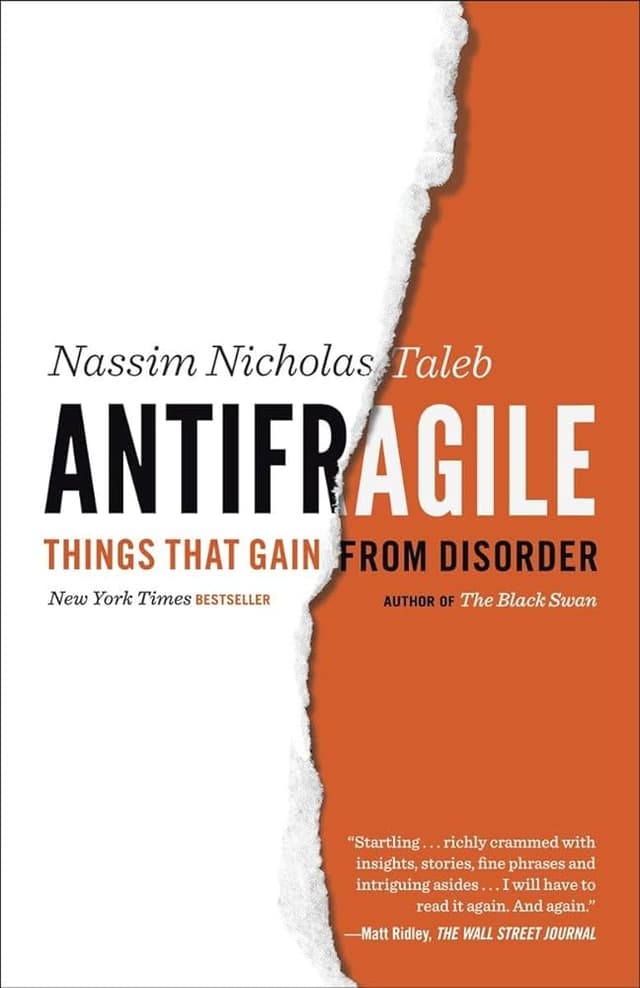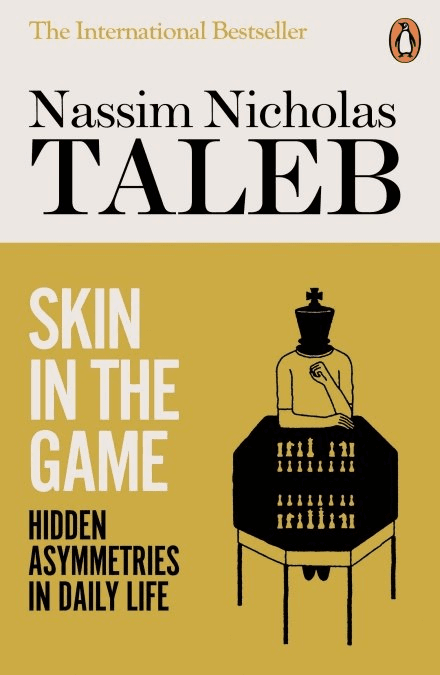Antifragile: Things That Gain from Disorder vs. Skin in the Game: Hidden Asymmetries in Daily Life
Antifragile: Things That Gain from Disorder
"Antifragile: Things That Gain from Disorder" by Nassim Nicholas Taleb is a groundbreaking exploration of systems and entities that thrive and grow stronger in the face of stress, volatility, and chaos. Taleb introduces the concept of "antifragility," which goes beyond resilience or robustness. Through a mix of philosophy, practical wisdom, and real-world examples, Taleb illustrates how embracing uncertainty and leveraging disorder can lead to success and innovation. This book is essential for anyone interested in risk management, personal development, and understanding how to benefit from uncertainty and change.
Skin in the Game: Hidden Asymmetries in Daily Life
Skin in the Game: Hidden Asymmetries in Daily Life is a nonfiction book by Nassim Nicholas Taleb, published in 2018. Taleb’s main point is pretty simple: people should share in the risks of the decisions they make. If you benefit from something, you should also face the downsides if things go wrong. He calls this having “skin in the game.” Without that, people can make reckless choices that hurt others while staying safe themselves. The book covers everything from politics and business to religion and everyday life. Taleb doesn’t hold back on criticism. He talks about how some policymakers and financial experts make decisions that affect millions but don’t suffer when those decisions backfire. He uses examples like bankers profiting during booms but getting bailed out during crashes. Taleb also goes after what he calls “Intellectual Yet Idiot” types—educated people who, in his view, complicate things and give advice without understanding real-world consequences. He argues that real k...


Reviews
Reviewed on 2/29/2024
I remember reading Antifragile when it first came out and it made a huge impression. It changed the way I think in plenty of subtle ways. I've been rereading Nassim Nicholas Taleb recently, starting with Black Swan. I really want to reread Antifragile this year too.
Reviews
| Item | Votes | Upvote |
|---|---|---|
| Innovative and original concepts | 1 | |
| Practical applications across various fields | 1 | |
| Engaging and thought-provoking narrative | 1 |
| Item | Votes | Upvote |
|---|---|---|
| Taleb's writing style can be polarizing | 1 |
| Item | Votes | Upvote |
|---|---|---|
| Insightful and provocative arguments | 1 | |
| Applies to various aspects of life | 1 | |
| Engaging and accessible writing style | 1 | |
| A sensible approach to ethics | 1 |
| Item | Votes | Upvote |
|---|---|---|
| Some arguments can be repetitive | 1 | |
| Taleb's confrontational tone may not appeal to everyone | 1 |
Frequently Asked Questions
'Antifragile: Things That Gain from Disorder' and 'Skin in the Game: Hidden Asymmetries in Daily Life' both offer unique insights by Nassim Nicholas Taleb. 'Antifragile' introduces the innovative concept of antifragility, which goes beyond resilience and robustness, making it essential for those interested in risk management and personal development. On the other hand, 'Skin in the Game' focuses on the importance of personal risk in decision-making and ethics. If you are more interested in understanding how to thrive in uncertainty, 'Antifragile' may be more appealing. However, if you are looking for insights into the importance of accountability and ethical behavior, 'Skin in the Game' could be the better choice.
'Antifragile: Things That Gain from Disorder' is praised for its innovative and original concepts, practical applications across various fields, and engaging narrative. It is particularly valuable for readers interested in leveraging uncertainty and volatility for success. In contrast, 'Skin in the Game: Hidden Asymmetries in Daily Life' is noted for its insightful and provocative arguments, applicability to various aspects of life, and sensible approach to ethics. It emphasizes the importance of having a stake in outcomes for true knowledge and ethical behavior.
While 'Antifragile: Things That Gain from Disorder' is highly regarded for its innovative concepts, some readers may find Taleb's writing style polarizing. 'Skin in the Game: Hidden Asymmetries in Daily Life' has its own drawbacks, such as repetitive arguments and a confrontational tone that may not appeal to everyone. Therefore, the choice between the two may depend on your tolerance for these stylistic elements and your specific interests.
'Antifragile: Things That Gain from Disorder' offers more practical applications across various fields, as it explores how systems and entities can thrive and grow stronger in the face of stress, volatility, and chaos. It provides valuable insights for risk management, personal development, and innovation. While 'Skin in the Game: Hidden Asymmetries in Daily Life' also offers practical insights, its primary focus is on the importance of personal risk in decision-making and ethics, which may appeal more to readers interested in these specific areas.
Both 'Antifragile: Things That Gain from Disorder' and 'Skin in the Game: Hidden Asymmetries in Daily Life' have engaging and accessible writing styles. However, 'Skin in the Game' is particularly noted for its engaging and accessible writing, making complex concepts easier to understand for a broad audience. 'Antifragile' is also engaging but may be polarizing for some readers due to Taleb's distinctive writing style.
'Antifragile: Things That Gain from Disorder' by Nassim Nicholas Taleb is a groundbreaking exploration of systems and entities that thrive and grow stronger in the face of stress, volatility, and chaos. Taleb introduces the concept of 'antifragility,' which goes beyond resilience or robustness. Through a mix of philosophy, practical wisdom, and real-world examples, Taleb illustrates how embracing uncertainty and leveraging disorder can lead to success and innovation. This book is essential for anyone interested in risk management, personal development, and understanding how to benefit from uncertainty and change.
Pros of 'Antifragile: Things That Gain from Disorder' include its innovative and original concepts, practical applications across various fields, and an engaging and thought-provoking narrative. However, a con noted by some readers is that Taleb's writing style can be polarizing.
Nassim Nicholas Taleb is a renowned scholar, statistician, and former trader known for his work on probability, uncertainty, and risk management. He is the author of several influential books, including 'The Black Swan,' 'Fooled by Randomness,' and 'Antifragile.' Taleb's work often focuses on the limits of knowledge and the impact of rare, unpredictable events.
'Skin in the Game: Hidden Asymmetries in Daily Life' is a nonfiction book by Nassim Nicholas Taleb that argues people should share in the risks of their decisions. Taleb emphasizes that if someone benefits from a decision, they should also face the potential downsides. The book critiques various sectors, including politics and finance, highlighting how decision-makers often escape the consequences of their actions. It explores themes of accountability and the importance of real-world experience over theoretical knowledge.
Nassim Nicholas Taleb is a Lebanese-American essayist, scholar, and statistician known for his work on risk, uncertainty, and decision-making. He is the author of several influential books, including 'The Black Swan' and 'Antifragile.' Taleb's writing often critiques conventional wisdom and emphasizes the importance of practical experience in understanding complex systems.
Pros of 'Skin in the Game' include its insightful and provocative arguments, applicability to various aspects of life, engaging writing style, and a sensible approach to ethics. However, some cons are that certain arguments can be repetitive, and Taleb's confrontational tone may not appeal to everyone.
The main themes of 'Skin in the Game' include accountability, the importance of sharing risks in decision-making, the critique of policymakers and financial experts who evade consequences, and the influence of stubborn minorities on societal choices. Taleb also discusses the concept of real knowledge being derived from practical experience rather than theoretical understanding.
Nassim Nicholas Taleb's writing style in 'Skin in the Game' is direct and sometimes blunt. He is known for his no-nonsense approach, which some readers appreciate for its clarity and honesty, while others may find it overly combative or confrontational.



















